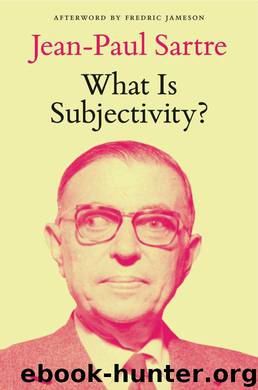1784781371 (PHY) by Jean-Paul Sartre

Author:Jean-Paul Sartre
Language: eng
Format: mobi
Publisher: Verso Books
Published: 0101-01-01T00:00:00+00:00
___________
1Francesco Valentini (1924–), philosophy historian, and author, in 1958, of La filosofia francese contemporanea. He published Il pensiero politico contemporaneo in 1979, and Soluzioni hegeliane in 2001.
2‘La Transcendance de l’Ego: esquisse d’une description phénoménologique’, Recherches philosophiques, no. 6, 1936/37, pp. 85–123, republished by Sylvie Le Bon under the same title in 1966 (Paris: Vrin) and then by Vincent de Coorbyter, La Transcendance de l ‘Ego et autres textes phénoménologiques (Paris: Vrin, 2003).
3‘Every human reality is a passion in that it projects losing itself so as to found being and by the same stroke to constitute the In-itself which escapes contingency by being its own foundation, the Ens causa sui, which religions call God. Thus the passion of man is the reverse of that of Christ, for man loses himself as man in order that God may be born. But the idea of God is contradictory and we lose ourselves in vain. Man is a useless passion’: Being and Nothingness, p. 615.
4‘No, a worker cannot live like a bourgeois. In today’s social organisation he is forced to undergo to the limit his condition as a wage-labourer. No escape is possible; there is no recourse against it. But man does not exit in the same way that a tree or a pebble does: he must make himself a worker. Though he is completely conditioned by his class, his salary, the nature of his work, conditioned even in his feelings and his thoughts, it is nevertheless up to him to decide on the meaning of his condition and that of his comrades. It is up to him, freely, to give the proletariat a future of constant humiliation or one of conquest and triumph, depending on whether he chooses to be resigned or a revolutionary. And this is the choice for which he is responsible. He is not at all free to choose: he is implicated, forced to wager; abstention is also a choice. But he is free to choose at the same time his destiny, the destiny of all men, and the value to be attributed to humanity. Thus does he choose himself simultaneously as a worker and a man, while at the same time conferring a meaning upon the proletariat. Such is man as we conceive him: integral man. Totally committed and totally free. And yet it is the free man who must be delivered, by enlarging his possibilities of choice. In certain situations there is room for only two alternatives, one of which is death. It is necessary to proceed in such a way that man, in every circumstance, can choose life’: Jean-Paul Sartre, ‘Introducing Les Temps modernes’, in ‘What Is Literature?’ and Other Essays, Cambridge, MA: Harvard University Press, 1988, p. 265. Translation altered.
5Phenomenology of Perception, trans. Colin Smith, London: Routledge & Kegan Paul, 1962, pp. 76ff.
6Valentini is referring to a prior intervention by Lucio Colletti, not included here.
7Gaston Fessard (1897–1978), Jesuit. The work here being referred to is La dialectique des exercices spirituels de Saint Ignace de Loyola (Paris: Aubier, 1956).
Download
This site does not store any files on its server. We only index and link to content provided by other sites. Please contact the content providers to delete copyright contents if any and email us, we'll remove relevant links or contents immediately.
The remains of the day by Kazuo Ishiguro(7579)
Tools of Titans by Timothy Ferriss(6971)
The Black Swan by Nassim Nicholas Taleb(6208)
Inner Engineering: A Yogi's Guide to Joy by Sadhguru(5917)
Giovanni's Room by James Baldwin(5898)
The Way of Zen by Alan W. Watts(5813)
The Six Wives Of Henry VIII (WOMEN IN HISTORY) by Fraser Antonia(4801)
The Power of Now: A Guide to Spiritual Enlightenment by Eckhart Tolle(4776)
Astrophysics for People in a Hurry by Neil DeGrasse Tyson(4631)
Asking the Right Questions: A Guide to Critical Thinking by M. Neil Browne & Stuart M. Keeley(4605)
12 Rules for Life by Jordan B. Peterson(3755)
The Ethical Slut by Janet W. Hardy(3516)
Skin in the Game by Nassim Nicholas Taleb(3485)
Housekeeping by Marilynne Robinson(3424)
The Art of Happiness by The Dalai Lama(3393)
Double Down (Diary of a Wimpy Kid Book 11) by Jeff Kinney(3288)
Skin in the Game: Hidden Asymmetries in Daily Life by Nassim Nicholas Taleb(3276)
Walking by Henry David Thoreau(3240)
12 Rules for Life: An Antidote to Chaos by Jordan B. Peterson(3211)
